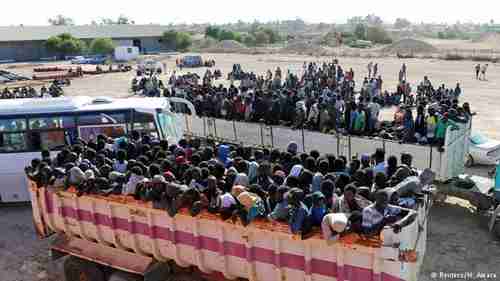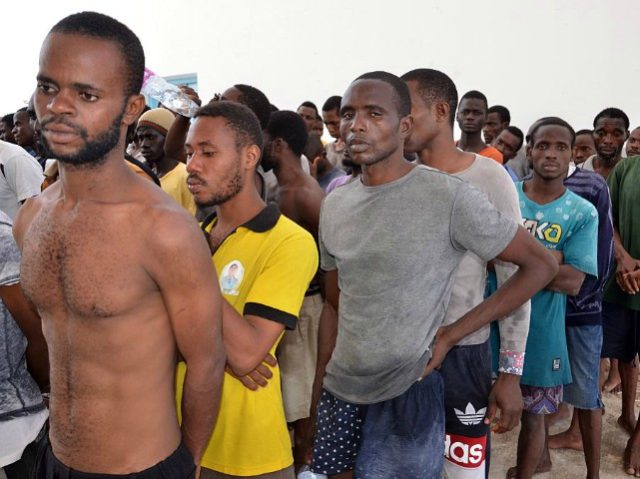This morning’s key headlines from GenerationalDynamics.com
- Italy’s deals with Libya’s warlords substantially reduce flow of refugees
- Italy accused of turning a blind eye to atrocities received by refugees in detention centers
Italy’s deals with Libya’s warlords substantially reduce flow of refugees

Migrants from Libya’s port of Sabratha are transported to detention centers by Italy’s deal with warlords (Reuters)
A record 180,000 refugees crossed the Mediterranean from Libya to Italy in 2016, and Italian officials had been expecting that number to increase in 2017. Instead, the number has fallen substantially, thanks to a series of deals that Italy’s government made with Libya’s tribes, warlords, and coast guard, even though the deals have been widely condemned by humanitarian and human rights organizations.
The number of crossings in July 2017 was half what it was in July 2016 and, in August, 20 percent of what it was a year earlier. Crossings were down from nearly 28,000 people in June to below 10,000 in August.
The reduction in the flow of refugees is attributed to a series of deals that Italy has made with various tribes and government officials in Libya during June to cut off the migrant flow. Many of the deals were with tribes along Libya’s southern border, to prevent refugees coming from West Africa from entering Libya from Chad, Mali, and Niger.
The initiator of the agreement was Italy’s interior minister Marco Minniti. According to Minniti:
But my conviction was the southern border of Libya is crucial for the southern border of Europe as a whole. So we have built a relationship with the tribes of southern Sahara. They are fundamental to the south, the guardians of the southern border, but they had been fighting one another and that meant the southern border was not controlled.
On 31 March the tribes came to my office here in Rome. It was a very difficult discussion; 72 hours were needed to to try to find a solution and to build a peace that respected their independence. All this was very complicated, more complicated than you can imagine, but they were looking for a solution. My conviction is that at a certain point [when] these conflicts become unsustainable the important thing is to be ready when someone is looking for a solution.
That wasn’t all. Minniti also made deals with the mayors of 14 cities in Libya:
We discussed a pact. It was quite simple: engage yourself against the trafficking of human beings and we will help you to build an alternative economy. The problems at the moment is trafficking has been the only industry in Libya capable of producing an income revenue.
What was the alternative economy? The tribal militias in these cities had only one major source of income: to become human traffickers and collect money from refugees to put them on boats, push the boats out into the Mediterranean, and hope that they will be rescued by NGOs. In many cases, Italy has accused NGOs of being in telephone contact with these human trafficking militias and paying off the militias to let them know when refugee boats were pushed out into the sea.
So Minniti offered to provide aid to these mayors to replace the funds received from human trafficking. According to Minniti:
When I met a sultan of the tribes he said: ‘You have to help me so that my children so that can lead a different life from trafficking.’ We have taken these projects to the European commission. These people want to change and it is the duty of the international community to help in this reconversion.
In return for the aid, the militias are responsible for detaining the migrants and keeping them in refugee camps.
In August, Rome also signed deals with the Libyan coastguard to help it deal with people smuggling, and to permit Italy to perform naval operations in Libyan waters.
These deals are considered to be morally questionable, but their effect has been dramatic in cutting the refugee flow to Italy and the number of drownings in the Mediterranean Sea substantially.
Italy’s prime minister Paolo Gentiloni bragged about the results on Wednesday:
Italy is proud to be a good example on the issue of migrants. We have reduced the number of people dying at sea and the number of irregular-migrant arrivals.
Gentiloni said that Italy was a model for Europe on how to reduce migrant arrivals. Reuters and Irish Times and Guardian (London)
Italy accused of turning a blind eye to atrocities received by refugees in detention centers
The deals that Italy’s government has signed with Libya’s warlords, tribes, militias, and coast guard have dramatically reduced the flow of refugees, but Italy is being accused of turning a blind eye to the abuse that refugees receive in “concentration camps,” where they have been left hungry, brutalized, raped and tortured.
U.N. agencies have said that Italy’s policies had trapped tens of thousands of people in dire conditions in Libya. This is particularly true in Libya’s port of Sabratha, which Libyan human smugglers have long used as an operations base and main port for their boats heading across the Mediterranean Sea. Last week, 4,000 migrants were found, trapped in various locations around the city, often starving.
Commissioner Nils Muiznieks of the Council of Europe Human Rights wrote to Italy’s interior minister Marco Minniti, all but accusing Italy of violating human rights laws:
The case law of the European Court of Human Rights is clear about this duty and I think it bears relevance for Italy’s operations in Libyan territorial waters. In light of recent reports on the current human rights situation of migrants in Libya, handing individuals over to the Libyan authorities or other groups in Libya would expose them to a real risk of torture or inhuman or degrading treatment or punishment, … [violating] Article 3 of the European Convention on Human Rights.
Finally, the Commissioner requests information about the measures to ensure that search and rescue operations in the Mediterranean, including those conducted by non-governmental actors, can continue to be carried out effectively and in safety.
Muiznieks added, “The fact that such actions would be carried out in Libyan territorial waters does not absolve Italy from its obligations under the convention.”
In fact, based on news reports, the evidence is that Minniti has taken no steps at all to prevent refugees from being exposed to atrocities. According to the deals, the Libyan warlords and militias detain the refugees, do not allow them to proceed to Europe, but instead lock them up in detention centers where any form of abuse can be performed on them with impunity. Deutsche Welle and Council of Europe-Commission of Human Rights and Deutsche Welle and BBC
Related Articles
- EU countries refuse to help Italy deal with massive refugee crisis (16-Jul-2017)
- Italy begs for help after 12,000 migrants arrive in four days (30-Jun-2017)
- Italy prepares for possible Mediterranean refugee crisis this summer (05-May-2017)
- EU migrant crisis moves to Italy as Austria begins closing border (13-Apr-2016)
KEYS: Generational Dynamics, Italy, Libya, Sabratha, Mediterranean Sea, Chad, Mali, Niger, Marco Minniti, Paolo Gentiloni, Nils Muiznieks, Council of Europe Human Rights
Permanent web link to this article
Receive daily World View columns by e-mail

COMMENTS
Please let us know if you're having issues with commenting.